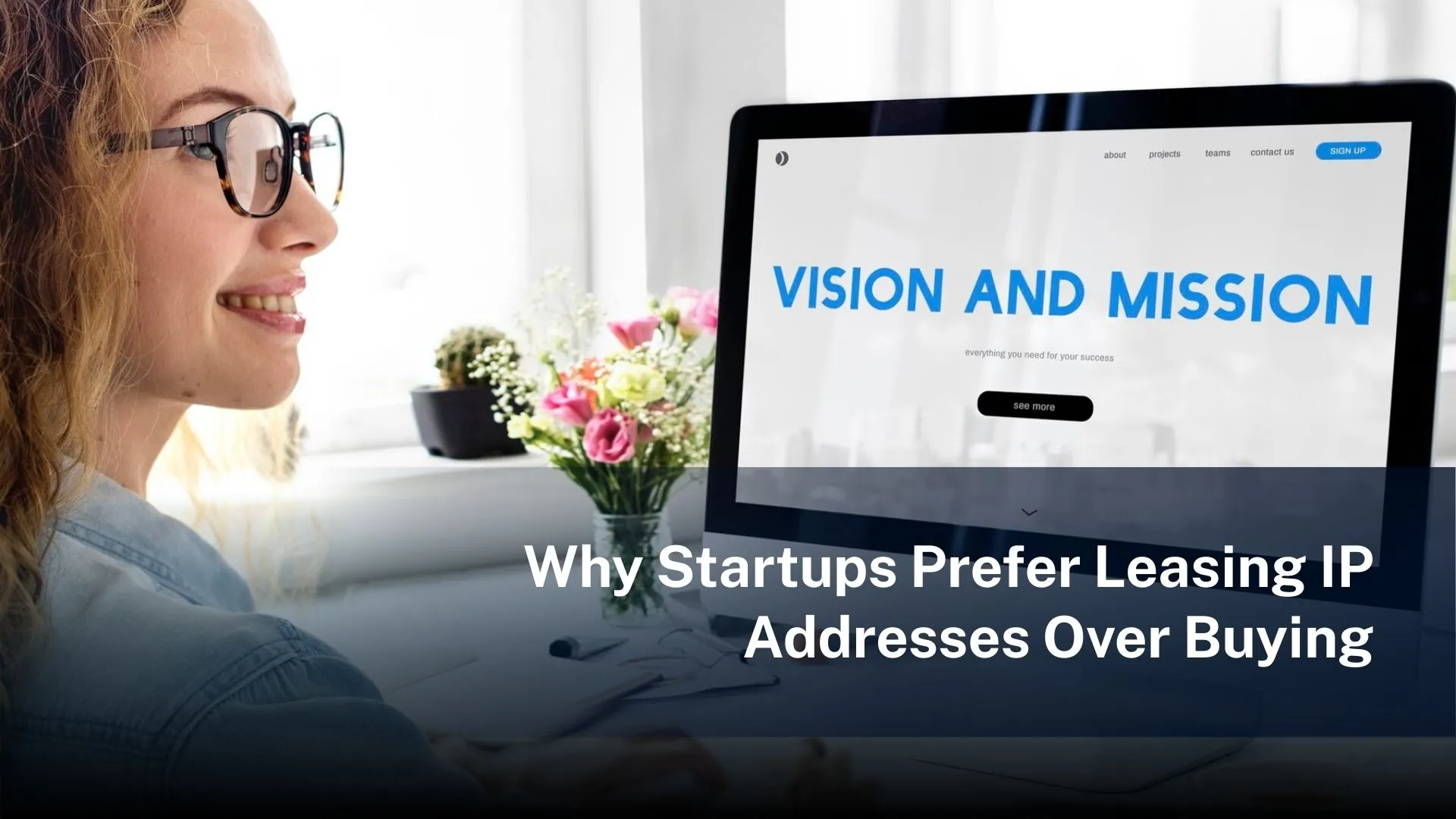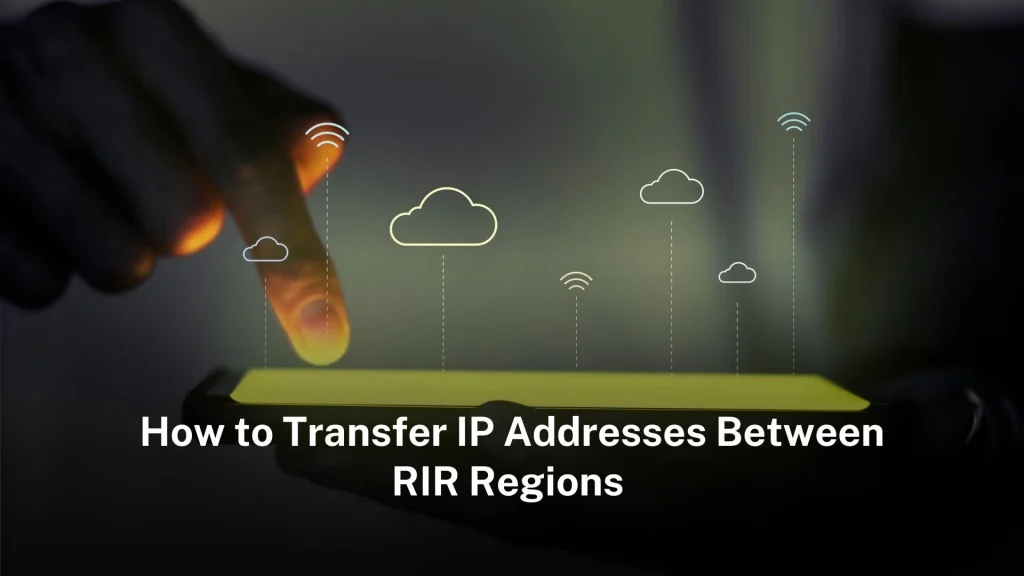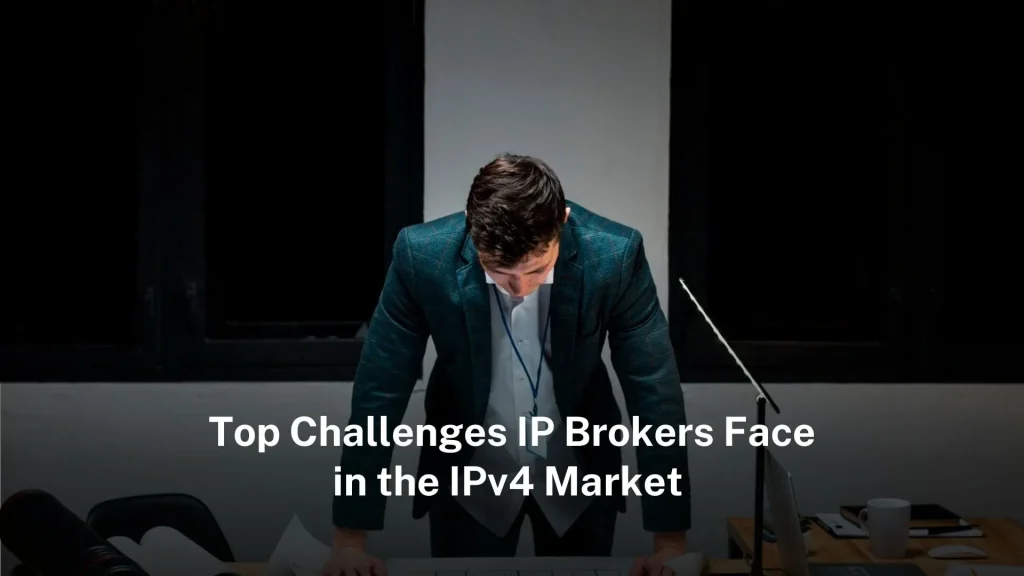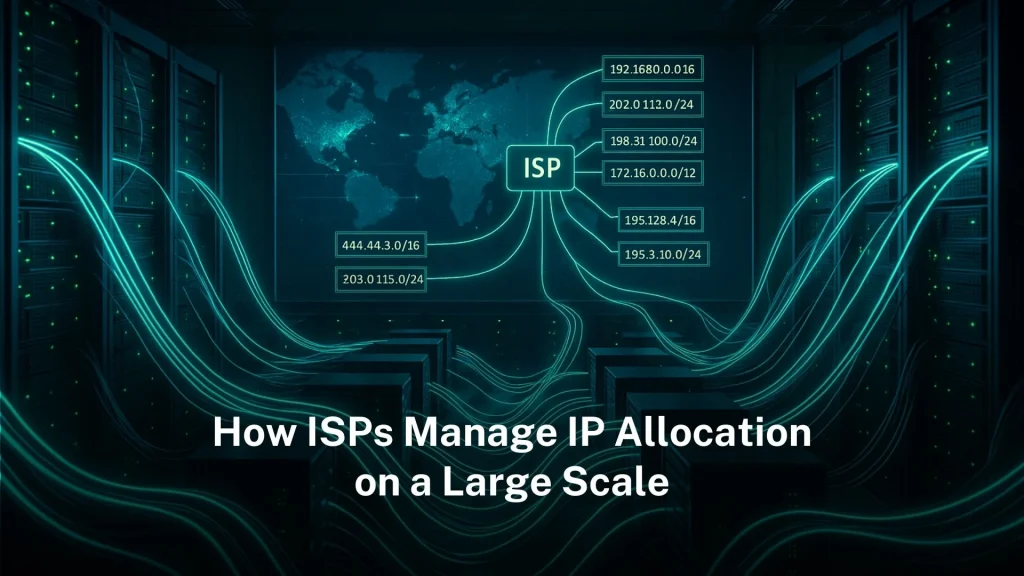- In order to lower upfront expenses, scale swiftly, and steer clear of long-term commitments as they expand, startups lease IP addresses.
- While ownership may meet stable, long-term needs, leasing provides flexible terms for clean, secure IPv4 access.
Early-stage startups require quick access to versatile solutions to conserve finances and address crucial technical challenges. The option to lease IP addresses as opposed to buying them has grown in popularity due to lower upfront investment, speedier access to clean addresses, and improved scalability. Businesses in the very first stage period find that leasing addresses matches best with their erratic growth patterns and financial constraints.
Startups are now able to leverage their cash flow for other essential functions such as product marketing or development. Formerly frozen capital now turns into fluid cash flow since leasing addresses permits monthly payments instead of upfront payments of thousands. Easing the strain of financial burdens in the form of excess hardware spending also streamlines complex multi-dimensional financial forecasting and eliminates the need for intricate budgets in future periods.
Another essential element is time. The purchase of IPV4 addresses can extend to weeks and even months due to the need for brokers, competition, and routing approval. On the other hand, lease providers can grant IP address leasing instantaneously through API, enabling unprecedented speed not possible in hectically packed environments. The capability to swiftly gain and deploy IPs literally in minutes greatly aids startups in the deployment and acquisition of features.
The scarcity of ipv4 and why leasing matters
IPv4 addresses ran out in 2011. The free pool dried up, and people now buy new addresses from secondary markets at high prices. IPXO reports that the typical cost of an IPv4 address jumped from about $5 in 2011 to $50 by 2022. In contrast, you can rent one for just 50 cents per month on average. This price difference makes renting a cheaper option for new companies in the short term.
While IPv6 represents the way forward many networks and services still depend on IPv4 because of compatibility problems. This situation means new companies need IPv4 addresses now and can’t wait for everyone to adopt IPv6. Renting gives quick access without the big upfront cost of buying blocks outright.
Buying a large IPv4 block might set you back tens of thousands of dollars right off the bat. For a startup short on cash, that’s often too much to handle. Renting allows startups to get just the IPs they need when they need them tying expenses to real use and expansion.
Cost efficiency and flexibility of leasing
Leasing IP addresses turns big upfront costs into easy monthly payments. New companies pay fees based on how much they use and grow. When more people visit their site because of ads or new users signing up, they can get more IPs on lease. If things slow down or they change direction, they can cut back on leases and save money right away.
Companies like PubConcierge and IPXO let you rent IPs for as short as a month or as long as a few years so new businesses can pick what works for them. This gives them more options than buying, which means you’re stuck with a set number of IPs no matter what happens later.
Renting also cuts down on risks. New companies don’t have to buy expensive things they might not need later. If they change how they do business or update their tech setup, they can scale back or get rid of rented IPs.
Lee Howard Senior VP at IPv4.Global, believes leasing has appeal due to “a lower initial financial outlay compared to purchasing making it an attractive option for startups”. This perspective shows how leasing fits new companies with tight budgets and unclear requirements.
Speed to market: why leasing beats buying
Time plays a key role in the startup world. Quick changes and market reactions can determine a company’s success or failure. Buying IPv4 addresses often takes a long time. It involves talks with brokers legal checks, approvals from registries, and setting up routing. This can last for weeks or months.
Companies that lease addresses have made this process faster. They use online platforms and APIs to automate approvals and setup. IPXO says many leases start within a day. PubConcierge offers setup on the same day. This allows startups to use new IP blocks.
This quick process helps startups a lot. It’s useful when they run campaigns that depend on time, launch features in new areas, or need to handle sudden traffic increases. Leasing helps them avoid delays that could slow growth or cause lost money.
A medium-sized online shop working with InterLIR got more IP resources in two days. This helped them handle a surge in sales during Black Friday. They avoided service problems and kept their customers happy.
Reputation and ip hygiene managed by providers
Reputation is crucial for startups, particularly when it comes to emailing, using APIs, and hosting public services. Blacklisting IP addresses with a history of spam, abuse, or hijacking can undermine customer confidence and service dependability.
Leasing companies are aware of this difficulty and usually keep their IP pools tidy and under close observation. To stop hijacking and routing problems, platforms such as IPXO and PubConcierge run daily abuse scans, blacklist checks, and use RPKI (Resource Public Key Infrastructure) to validate addresses.
Startups can save a lot of money by using these services instead of handling their own reputation, which calls for specialised knowledge and constant attention to detail. When core teams are concentrating on product development, this peace of mind is priceless.
Leasing platforms “offer a combination of cost savings, operational simplicity, and ongoing IP reputation management,” according to Lee Howard of IPv4.Global, who emphasised that outsourcing hygiene is a crucial leasing advantage.
Hybrid approaches: mixing leased and owned ip addresses
Although leasing meets the short-term needs of startups, many businesses eventually implement hybrid IP strategies as they grow. While continuing to lease extra addresses for differing workloads like marketing campaigns, testing, or geographical expansion, they buy a stable core of IP addresses to maintain permanent authority over vital services. This strategy enables companies to keep control where it counts most while keeping the flexibility to swiftly scale resources in reaction to changes in demand.
For instance, a SaaS business may lease a /22 block (1,024 IPs) during times of high demand, like product launches, but own a /24 block (256 IPs) supporting its primary platform. Leased technology can be released after the peak, reducing costs without tampering with vital facilities. This balance preserves the flexibility and capital efficiency of renting while offering the advantages of ownership, including going on control, potential asset appreciation, and compliance certainty. Transparent leasing marketplaces that support these mixed models are provided by providers such as InterLIR.
Choosing the right leasing provider
When leasing IP addresses, startups should thoroughly assess providers, taking into account important elements like service level agreements, open pricing, IP reputation management, automation APIs, and routing security features like RPKI support. Selecting a supplier who effectively manages these elements can lower operational risks and make network administration easier. To maintain clean and dependable IP blocks, it’s critical to seek partners who update registry records, manage routing authorisations (LOAs), and regularly check IP reputations.
These crucial services are provided by top providers like IPXO, PubConcierge, and InterLIR, though their contract terms and pricing structures may differ. For instance, InterLIR provides leases for a /24 block with no brokers or additional costs, starting at about $115 per month. Reputation management is emphasised by IPXO and PubConcierge, which also offer APIs to automate IP lifecycle procedures. To avoid unanticipated costs or interruptions in service, startups ought to choose providers who can grow with them, and provide reliable support, and uphold transparency about termination policies, auto-renewals, and IP recycling.
Managing lease contracts: Key considerations
Terms that impact how startups use and manage IP addresses are frequently included in leasing contracts. These might involve limitations on use, minimum commitment durations, cancellation notice requirements, and price shifts according to block size or location. Startups should carefully go in every detail of their agreements to prevent being locked into rigid agreements or later having to deal with unanticipated costs. Understanding how providers manage idle IPs is also crucial because some may reclaim unused or non-routed addresses after a specific amount of time. For this reason, startups must closely monitor deployment and maintain accurate records.
Contracts ought to include precisely what happens at the end of a lease and the terms to renewal. Without this clarity, a startup might encounter delays when switching providers or lose access to essential facilities. Particularly with regard to IP abuse, routing updates such as BGP announcements, and the management of LOAs, legal responsibilities should also be clearly defined. Reputable companies usually handle these administrative and technical tasks, allowing startups to concentrate on their main business and prevent interruptions.
Financial benefits of leasing
Leasing makes it simpler for startups to plan their budgets and manage cash flow by converting large upfront purchases into manageable monthly operating expenses. They pay regular monthly fees rather than tens of thousands all at once. In contrast to capital expenditures that must be spread out over a number of years, which can unnecessarily tie up funds, these payments are frequently fully tax deductible.
This kind of financial independence enables startups to expand. They can spend their money on hiring, product development, or market expansion instead of investing in property rights. Furthermore, it decreases the risk of being stuck with neglected trademarks in the case that demand varies or the company’s obviously shifts. In rapid environments in which idle resources are costly and time-to-solution is essential, this sort of dynamic capability may provide an important advantage.
When buying ip addresses still makes sense
For startups with consistent, long-term needs, buying IP addresses may make sense. It might be less expensive to own IPs than to lease them if demand is steady and unlikely to fluctuate over a number of years. The business obtains complete, permanent control over its vital infrastructure after purchase, and there are no further rental costs. For services that need direct control over routing or continuous uptime, this can be crucial.
Ownership may be necessary in some industries, in addition to being a practical consideration. Companies may be required by regulatory or compliance standards in industries such as healthcare or finance to own the IP resources and other infrastructure they depend on. Experts point out that after three to four years of consistent use, the break-even point for purchasing as opposed to leasing typically occurs. When their future is more certain, startups that anticipate steady growth and long-term use might find it advantageous to plan a move to ownership.
Expert insights and market outlook
IPXO’s VP of Strategic Sales, Paulius Judickas, highlights the scalability and practicality of leasing IP addresses. He notes that it enables telecom firms and startups to obtain essential IPv4 resources without having to pay high upfront fees. This ability to compete and expand without having to pay for address blocks outright can be a game-changer for startups.
This trend is supported by recent data. According to InterLIR’s 2025 market report, IP leasing has increased by almost 40% annually, demonstrating the growing need for flexible address allocation in the startup and enterprise sectors. In the meantime, since 2023, the use of RPKI has risen threefold, increasing the safety and accessibility of IP leasing. Because of these alterations, the leasing model has grown increasingly appealing to companies seeking flexible and safe network solutions.
Preparing your startup for ip leasing
Startups should carefully evaluate their IP needs prior to leasing. Specify the number of IPs needed for core services as opposed to short-term initiatives. Examine providers’ contract terms, automation capabilities, and abuse management. To prevent leased blocks from being lost owing to inactivity, set up procedures to track and monitor IP usage.
On-demand provisioning and scaling with low manual overhead are made possible by integrating leasing workflows into DevOps pipelines. Startups can maximise the value and agility of their IP leasing strategy thanks to this technical preparation.
FAQ
Can startups lease both IPv4 and IPv6?
Yes, most leasing providers offer both. IPv6 addresses are plentiful and generally easier to lease, but IPv4 remains critical for compatibility.
How quickly can leased IP addresses be deployed?
Typically within hours or less, depending on provider automation and account setup.
Is leasing more expensive than buying in the long term?
Leasing has ongoing costs that may exceed purchase price after three to four years, but offers greater flexibility.
What security features protect leased IPs?
Providers use RPKI, continuous abuse monitoring, blacklist alerts, and can rotate problematic IPs to maintain hygiene.
Do providers handle all registry and routing paperwork?
Yes, reputable providers manage LOAs, route object updates, and ensure proper registry filings, easing the burden on lessees.










Leave a Reply